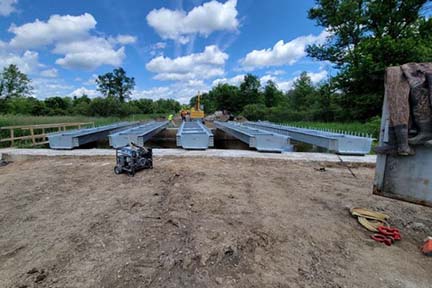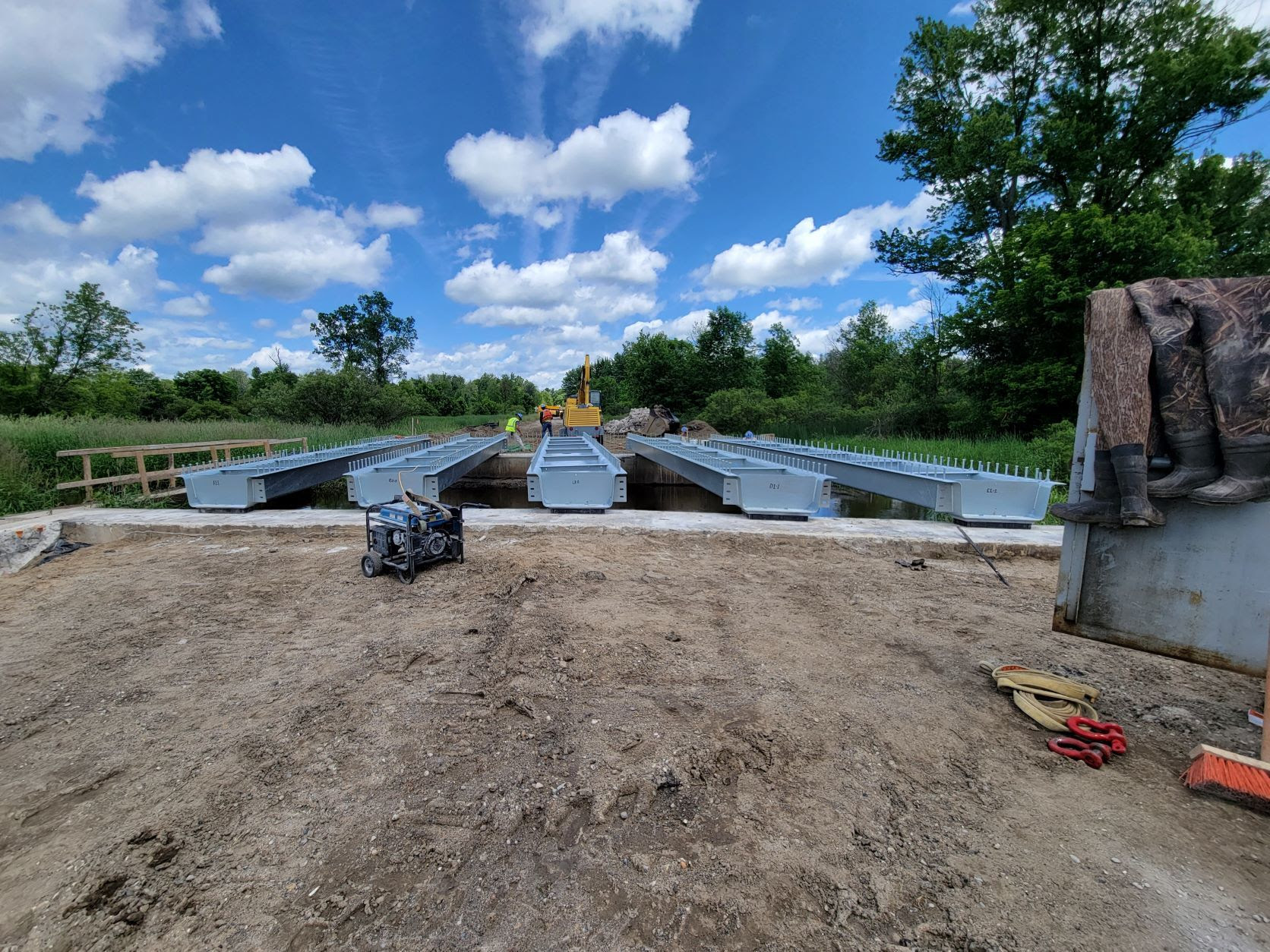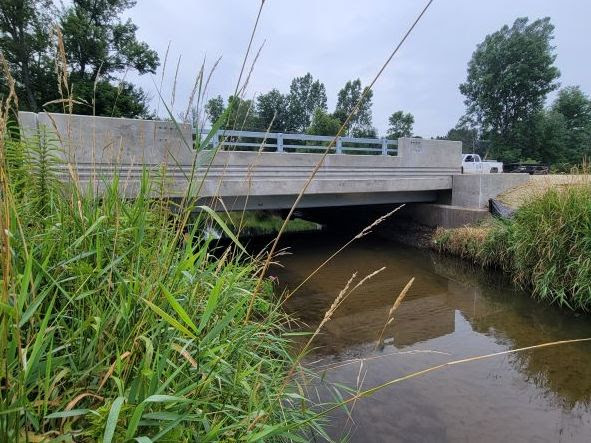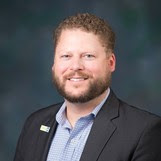
One bridge bundling project wraps up, others starting

|
FOR IMMEDIATE RELEASE
August 1, 2022 Dan Weingarten
906-250-4809
WeingartenD@Michigan.gov
One bridge bundling project wraps up, others starting
Fast facts:
– The Michigan Department of Transportation (MDOT) bridge bundling pilot project is moving forward, with a Livingston County bridge completion last week and the final five projects starting this month.
– The pilot currently encompasses major improvements to 19 locally owned bridges in 2022.
– MDOT expects the bridge bundling pilot project, which covers several projects under one contract, to streamline coordination and permitting, increase economies of scale, and improve bridge conditions on local routes.
– MDOT’s online dashboard at Michigan.gov/BridgeBundling allows the public to track progress on the projects.
LANSING, Mich. – This month is a busy one for the Michigan Department of Transportation (MDOT) bridge bundling pilot project, with repairs on the final five bridges included in the program scheduled to begin.
Seven local agency bridge bundling projects are now largely finished, with work on seven others nearing completion. Two more projects are starting today, with the final three set to begin later this month.
The Mason Road bridge over the south branch of the Shiawassee River in Livingston County was the most recent bridge to be repaired. While bridge work finished on Thursday, the road will not reopen to traffic immediately. MDOT and Livingston County have collaborated, allowing the county road commission to take advantage of the bridge closure to start a road project. The road and bridge will remain closed until around Oct. 1, when the county’s project is completed. Delaying the reopening, at the county’s request, will reduce inconvenience for stakeholders by condensing two potential closures into one tighter timeframe.
Steve Wasylk, managing director of the Livingston County Road Commission, said Mason Road is a vital connector for numerous areas in the county. It also serves as an alternate route if I-96 is closed for any reason, making the condition of the bridge very important.
“Prior to construction, we had reduced loading on the bridge and numerous holes in the deck,” Wasylk said. “Having this bridge included in the Bridge Bundling Pilot was a tremendous benefit to be able fix the bridge with no impacts to our budget.”
Livingston County has another bridge in the program, on Iosco Road, scheduled to be repaired starting Aug. 15. While not as highly traveled as Mason Road, Wasylk said it’s another important connection.
All of the bridges encompassed by the bridge bundling program will be completed and reopened to traffic within 60 or 90 days from the start of repairs, with the exception of Mason Road. The remaining bridges, along with scheduled start dates and contracted length of the project, are:
Lenawee County: Sand Creek Highway (Aug. 1, 90 days)
Livingston County: Iosco Road (Aug. 15, 60 days)
Luce County: Dollarville Road (Aug. 1, 60 days)
Macomb County: 26 Mile Road (August 15, 90 days)
St. Joseph County: Nottawa Road (Aug. 29, 90 days)
This year’s bridge bundling pilot project, the first of its kind in Michigan, is repairing 19 bridges in serious or critical condition that are owned by local agencies. Each bridge will have its superstructure replaced, which includes full removal and replacement of the bridge deck and supporting beams.
Adam Newton, project engineer for the Macomb County Department of Roads (MCDR), said “the bridge bundling program was a great resource for the department as it strives for a sustainable balance of bridge replacement, improvements and preventive maintenance to limit the number of bridges that slip into poor, serious or critical condition.”
“Having a few of the bridge superstructures that are in critical condition replaced within the bridge bundle pilot project has given the MCDR an opportunity to focus on implementing a mix of fixes for the remainder of our bridge inventory with traditional resources and funding,” Newton said.
Macomb County has three bridges, including 26 Mile Road, with repairs starting Aug. 15, in the pilot program.
The pilot project is funded by federal Highway Improvement Program (HIP) dollars. MDOT bridge staff and consultants are doing preliminary design and construction administration work for the bridge bundling program.
An online dashboard at Michigan.gov/BridgeBundling
The pilot program is only the first phase of the bridge bundling initiative with $196 million in federal COVID relief funds appropriated by Gov. Gretchen Whitmer and the Legislature will allow the state to execute Phase II of the bridge bundling program, beginning later this year, to address 59 more bridges.
A list of the Phase II bridges, which were prioritized based on regional mobility and safety, is available here. Phase II focuses on closed and load-posted bridges. Some will be permanently removed while others will be fully replaced.
MDOT expects bridge bundling, which covers several bridge locations under one contract, to streamline coordination and permitting, increase economies of scale, and improve bridge conditions on local routes around the state. MDOT is working to expand the approach, already in use on state trunkline projects, to address locally owned bridges.
###
Driving safely in work zones saves lives! Protect MI work zones by taking the pledge.
www.twitter.com/MichiganDOT |

The Mason Road bridge over the south branch of the Shiawassee River in Livingston County is shown under construction earlier this summer. The bridge, one of 19 to be repaired under the Michigan Department of Transportation (MDOT) bridge bundling pilot project, was completed last week. (Photo courtesy of RS&H)

The Mason Road bridge over the south branch of the Shiawassee River in Livingston County, one of 19 to be repaired under the Michigan Department of Transportation (MDOT) bridge bundling pilot project, was completed last week. The bridge will remain closed to traffic until October, at the county’s request, while a county road project is under way. (Photo courtesy of RS&H)







